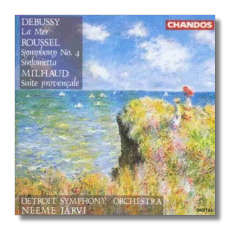
The Internet's Premier Classical Music Source
Related Links
-
Debussy Reviews
Milhaud Reviews
Roussel Reviews - Latest Reviews
- More Reviews
-
By Composer
-
Collections
DVD & Blu-ray
Books
Concert Reviews
Articles/Interviews
Software
Audio
Search Amazon
Recommended Links
Site News
 CD Review
CD Review
Albert Roussel

Symphony #4 & Sinfonietta
- Albert Roussel:
- Symphony #4
- Sinfonietta
- Darius Milhaud: Suite provencale
- Claude Debussy: La Mer
Detroit Symphony Orchestra/Neeme Järvi
Chandos CHAN9072 - 68min
Järvi obtains a glorious sound from the Detroit Symphony - by far the best since the halcyon days of Paul Paray. The strings are rich and solid, the woodwinds colorful and the brass crisp. While Järvi is to be commended for these technical achievements, he brings little understanding or depth to Debussy and Milhaud's familiar scores. The final movement of the Suite provencale is a good case-in-point. With Järvi's stomping rhythms and hectic pace, the beautiful theme completely loses its inherent charm and grace. What should be one seamless melodic line becomes breathless, crass, and humorless.
Järvi's La Mer is a much calmer affair than I'm accustomed to hearing. Tempos are generally slow and dynamic levels subdued. The only real fortissimos occur at the ends of I and III. The mystery, wonder, and vivid color of this glorious score is utterly lost on Järvi, who gives us a bland and emasculated reading which might possibly appeal to the "new age" crowd. The two Roussel works fare considerably better, especially Symphony 4, which is given a lively and idiomatic reading.
Chandos' engineers produce a distant, tubby sonic haze which is utterly lacking in the clarity that these four scores demand.
Copyright © 1995, Thomas Godell.
This review originally appeared in the American Record Guide


















